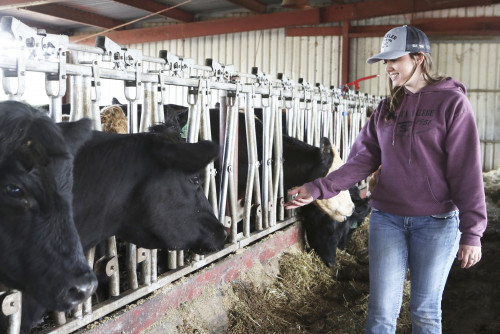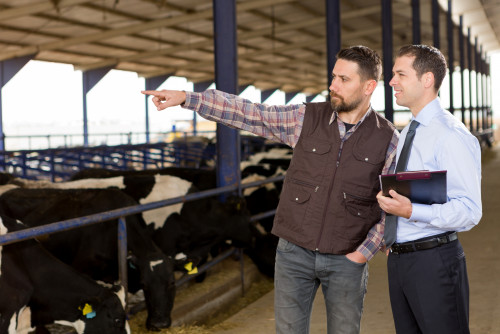Agriculture Business AS-T Degree
Provides students with the opportunity to meet the requirements for transfer to the CSU system in Agricultural Business.
Associate in Science for Transfer | SC Program: AS-T.2003
Whether it is hands-on manual labor in the fields, or working as a scientist in a lab or greenhouse, Agriculture offers a huge range of specialties. As the science of raising plant crops and livestock, agriculture teaches the essentials of farming and ranching.
The Associate in Science in Agricultural Business for Transfer Degree (AS-T in Agricultural Business) provides students with the opportunity to meet the requirements for transfer to the California State University system in Agricultural Business. In order to earn this degree a student must complete 60 required semester units of CSU-transferable coursework with a minimum GPA of 2.0. Completing this degree guarantees admission to the CSU system but not to a particular campus or major. The degree is designed to prepare students for upper division study in Agricultural Business and related fields.
Agricultural Business graduates at the bachelor’s level are qualified for employment by industry in a variety of jobs, in areas such as marketing of crops and related agricultural production equipment, banking and production loans, food processing, international marketing and agricultural policy.



Choose your path
Map your education by viewing the program map for the degree or certificate you’re interested in earning below. Meet with a counselor to create your official comprehensive education plan.
A program map shows all the required and recommended courses you need to graduate and a suggested order in which you should take them. The suggested sequence of courses is based on enrollment and includes all major and general education courses required for the degree.
Fall Semester, First Year
14 Units TotalIn this course, students receive instruction in academic reading and writing, including writing processes, effective use of language, analytical thinking, and the foundations of academic research. An argumentative research essay is required for the successful completion of the course. This course may be offered in a distance education format.
This course is a survey of the history of the United States from 1877 to the present. The course covers the rise of industrialization, the expansion of America into world affairs, the causes and results of the Great Depression, the world wars of the 20th century, the Cold War, and post-9/11 America. This course satisfies the CSU requirement for US History (US-1). This course may be offered in a distance education format.
The course is designed to develop leadership qualities in students. "Hands-on" techniques will be used to facilitate problem solving, cooperative work ethics, developing initiative, managing and organizing information, flexible thinking and effective questioning. Practical experience in conducting business as a group will be gained by participation.
Spring Semester, First Year
16 Units TotalThis course is a comparative survey of the major ancient world civilizations which developed between 3500 B.C.E. and 1500 C.E. It examines political institutions, religious ideologies, the rise and fall of empires, and the major cultural innovations of each of the major world civilizations. This course may be offered in a distance education format.
Fall Semester, Second Year
14 Units TotalThis course is a survey of inorganic chemistry and some organic chemistry suitable for agriculture and nursing students. The basic fundamentals of the metric system, chemical nomenclature, atomic and molecular structure, chemical reactions, energy changes, states of matter, solutions, chemical equilibria and kinetics, and organic functional groups are presented. The quantitative nature of chemistry is developed by introduction of the Avogadro's number and the mole and continuing with stoichiometry, gas law, solution concentrations, and pH calculations. The lecture/discussion portion of this course may be offered in a distance learning format.
Spring Semester, Second Year
16 Units TotalThis course takes an interdisciplinary approach to the study of race and ethnicity in the United States. It examines social justice movements in relation to ethnic and racial groups in the United States to provide a basis for a better understanding of the socioeconomic, cultural, and political conditions among key social groups including, but not limited to, Native Americans, African Americans, Asian Americans, and Latina/o Americans. This course examines the systemic nature of racial/ethnic oppression through an examination of key concepts including racialization and ethnocentrism, with a specific focus on the persistence of white supremacy. Using an anti-racist framework, the course will examine historical and contemporary social movements dedicated to the decolonization of social institutions, resistance, and social justice. This course may be offered in a distance education format.
This course is an introduction to government and politics in the United States and California. Students examine the constitutions, structure, and operation of governing institutions, civil liberties and civil rights, political behaviors, political issues, and public policy using political science theory and methodology. This course may be offered in a distance education format.
This course studies the basic economic institutions and principles as they pertain to the entire economic system such as money and banking, determinants of national income, employment, output and the roles played by government in using monetary and fiscal policy to promote the mandates of the Employment Act of 1946. This course may be offered in a distance education format.
This course offers an introduction to the biological principles of plant growth and development. Ecosystem relationships will be covered with particular emphasis on succession, water cycle, mineral cycle, and energy flow. In addition to investigating modern production and marketing practices of agronomic crops, the impact of commercial crop production upon mankind and the environment will be considered. The lecture portion of this course may be offered in a distance education format.
Please see a counselor to discuss options for meeting general education requirements for transfer to California State Universities (CSU) and/or University of California (UC) campuses, as well as any specific additional courses that may be required by your chosen institution of transfer.
*Alternative Courses: Please see a Shasta College counselor for alternative course options. You can also view the following to find other courses to meet degree/certificate requirements:
- California State Universities – General Education
- IGETC – Intersegmental General Education Transfer Curriculum
Contact Us for More Information
Counseling & Student Services
Contact InfoAcademic/Instructional Division Office
Start Your Future at Shasta College
We are dedicated to helping you reach your educational and career goals. To begin your journey, apply for admissions today!
